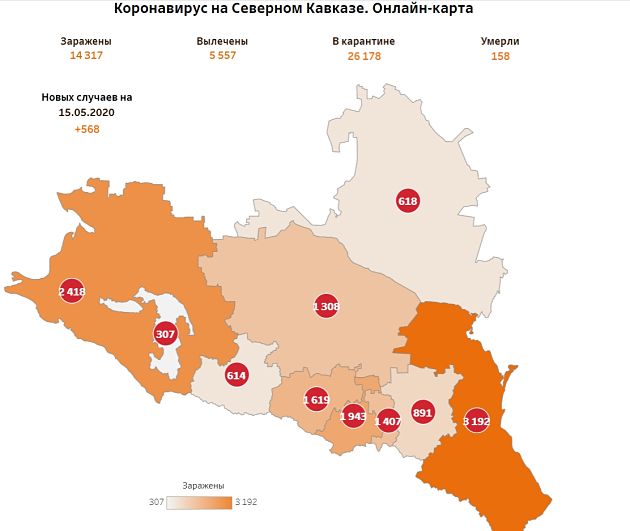Earlier this week, we wrote about how official statistics on the number of coronavirus cases and deaths in Russia are significantly underestimated (source). While Roskomnadzor is trying to block the original material with these calculations from the Financial Times, published by “MBH-Media”, the website “Meduza” published a new investigation on the same topic yesterday (source).
Public figures from the North Caucasus have expressed concern about the situation in their region. For example, the Council of Teips of the Republic of Ingushetia issued a statement claiming that the situation with the spread of the coronavirus infection in the republic has reached a dangerous point. “The head of the republic and the minister of health assured us that our region has everything necessary to fight this disease. However, it is now clear that these statements do not correspond to reality. According to information spread on the Internet and social networks, as well as reports from citizens, we know that the republic’s statistical data on the number of deaths from the infection are being manipulated, dividing them into victims of the coronavirus and those who died of extra-hospital pneumonia. According to available information, the number of deaths significantly exceeds the data provided by official statistics,” the statement said.
In view of the incompetence of the republican authorities, the Council of Teips called on Moscow to intervene – a case where the national community does not oppose such intervention, but expects it. An alarming article with a similar message was published yesterday by one of the largest media in Dagestan, “Novoe Delo”, under the title “Nearly 100,000 People May Die in Dagestan” (source).
“In small poor villages, 2-3 people die every day. Only the closest people accompany them to the cemetery, and then they die, too. There are no calls for doctors, emergency assistance, or even pathologists, as Vladimir Vasilyev mentioned. The problem is that these villages have run out of food. By the end of spring, nothing has grown, and the village’s winter stores are running out. Outside managers, of course, do not know that there are no banks in the villages, and they will not get interest-free loans to buy food. Recently, in many villages, people have survived by buying debt books from local shops, and residents have gone back to borrowing bread. They also have to pay for electricity, gas, livestock, land cultivation, children’s education and free textbooks. A huge thank you to everyone who sends food and money to these villages and supports the people in any way. These are businessmen, deputies, wealthy officials and ordinary citizens who contribute their efforts by volunteering and delivering aid in their personal cars. But the epidemic has no end in sight, and the head of Dagestan has not even outlined any plans. As a result, wealthy people will run out of money, and the inhabitants of poor villages will die of suffocation and hunger, because they will not be able to go to the cities to work, even as taxi drivers. According to rough estimates, which the leadership does not disclose, about 100,000 people will die in the republic. Not in one day or one month, but over the course of a year,” writes author Rasul Kadyev.
Given that the Dagestani authorities (in fact, Moscow’s appointees in Dagestan) have proven themselves incapable in this situation, he also pinned his hopes on direct intervention by Moscow, in particular the Russian security forces: “What should we strive for? We must draw attention to the villages where there is no Internet and where dying people, suffocating, cannot tell us about their tragedy. Only the army, the Emergencies Ministry and the police are capable of reaching such a large number of villages. But not to block them completely and let the people die in silence, but to organize the delivery of food, medicine and oxygen. Only the army and the Ministry of Emergency Situations can do that. And that requires a decision from the Supreme Commander. We want to see our military, the Russian National Guard, with Russian flags, loaded with food and medical equipment on KAMAZ and Ural trucks in all Dagestani villages. But even if we leave aside an evaluation of such demands from an Islamic perspective, we should doubt the prospects of their implementation. After all, Russia’s security forces are under the control of the Kremlin, which, according to many observers, quickly shifts responsibility to the regions when a real problem arises.
The Russian army and other bloated security forces are usually used by the Kremlin when it wants to seize a piece of territory from a neighboring state, or bomb people who have revolted against their tyrants thousands of miles away from Russia, or, in the worst case, to prevent an uprising by the Russian people themselves. However, they have not been involved in solving the problems of the Russians themselves – when such problems arise, they are passed on to the regions, as is happening now. The problem is that the Kremlin, through its long-standing policy, has already drained these regions beforehand – it has deprived them of their autonomy, terrorized everything that lives in them, and destroyed the back channel of communication between the population and the authorities that could have existed if there had been free direct elections. This is why Moscow’s puppet appointees in the republics, such as Kalimatov and Vasilyev, are so powerless. But it is doubtful that one can rely on those who appointed them as their proxies, thinking that Moscow will now establish order. It will not. The societies of the Caucasus must prepare to create their own alternative to Moscow’s power and its appointed officials, who will have to address the problems of their peoples in the face of the impending collapse of the Kremlin’s vertical power structure.

